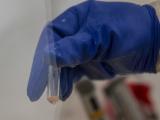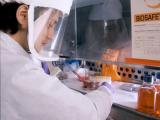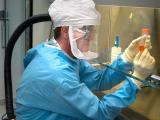Mar 12, 2004 (CIDRAP News) – The Department of Health and Human Services (HHS) announced plans today to buy up to 75 million doses of a new anthrax vaccine, or enough to inoculate 25 million people.
"HHS intends to acquire up to 75 million doses of the recombinant protective antigen (rPA) anthrax vaccine for the Strategic National Stockpile," the agency said in a news release. "The vaccine would be used to protect the public against a terrorist attack in which anthrax spores are released.
"The new rPA vaccine has already been shown to be stronger and more effective than the vaccine being used today," the statement continued. "It will require fewer doses per individual to provide immunity against the effects of anthrax inhalation."
HHS officials say the goal for rPA vaccines is to provide immunity with three doses, instead of the six doses and annual boosters required for the existing vaccine, called anthrax vaccine adsorbed (AVA). The US military requires anthrax shots for many of its personnel, and some have refused it because of concern about side effects.
Two companies—VaxGen, Inc., Brisbane, Calif., and Avecia, Manchester, UK—have been developing and testing rPA vaccines under HHS contracts. In October 2003, HHS awarded an $80 million contract to VaxGen and a $71 million contract to Avecia for clinical trials and production of 3 million doses by each firm. Both companies had won smaller contracts a year earlier for work on their vaccines.
HHS said companies bidding for the vaccine contract must submit proposals by Apr 16. An HHS spokesman in Washington, DC, said he didn't know if any companies other than VaxGen and Avecia are developing an rPA vaccine or would bid for the contract. More than one contract could be awarded, said the spokesman, who asked that his name be withheld.
The spokesman said HHS doesn't want to give a cost estimate for the vaccine contract at this point. A Washington Post story today, citing a congressional report, said the vaccine stockpile is expected to cost at least $700 million.
The new rPA vaccines are experimental and have not been licensed by the Food and Drug Administration (FDA). If an anthrax episode demanded use of the vaccines before they were licensed, they could be used under special emergency provisions, according to the HHS spokesman.
Protective antigen is a component of the toxin produced by Bacillus anthracis, the anthrax bacteria. Inhalational anthrax can be treated effectively with antibiotics, but the drugs must be given early in the course of illness, before the bacteria can multiply and release large amounts of toxin. Five people died and another 17 fell ill in the mail-borne anthrax attacks in 2001.
VaxGen recently reported that its anthrax vaccine, called rPA102, compared favorably with AVA in a phase 1 clinical trial. Reporting Mar 2 at the International Conference on Emerging Infectious Diseases in Atlanta, the company said that 100 adults received one of four different vaccine doses three times at 4-week intervals. As measured by antibody levels, immune responses to the higher doses of the new vaccine were comparable to responses to AVA, the company said in a news release.
The new vaccine was well tolerated, the company said. Local reactions, mostly arm pain, were more common with AVA (89.5% versus 34.4%; P=.03), but systemic reactions, mostly mild headache and fatigue, were more common with rPA102 (39% versus 18%; P<.001).
The HHS spokesman said the department's timeline calls for delivery of the first 25 million doses of vaccine within 2 years after a contract is awarded, but he didn't say how soon HHS expects to award a contract.
See also:
Mar 2 VaxGen news release
Oct 2, 2003, CIDRAP News story, "NIAID funds further development of new anthrax vaccines"



















